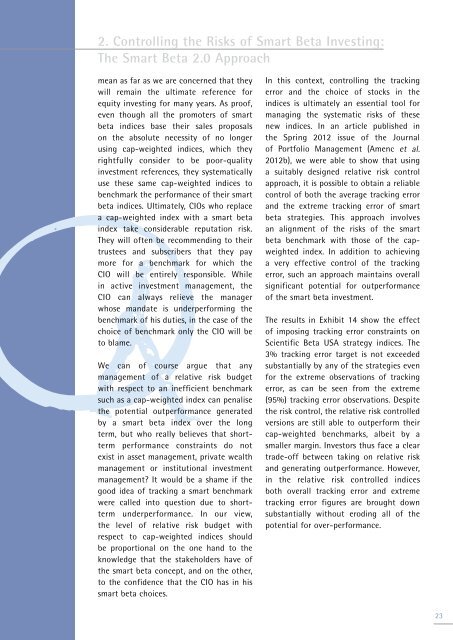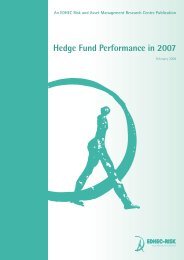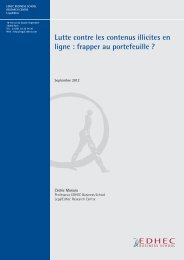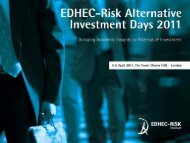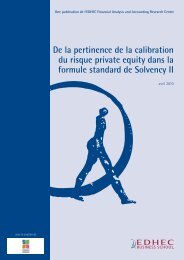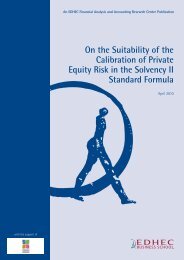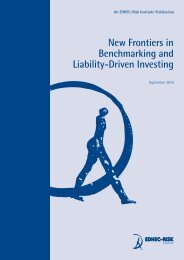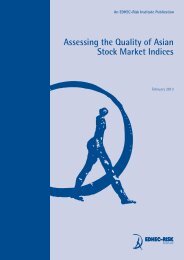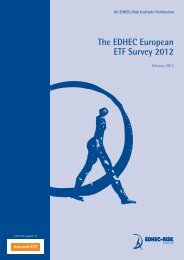Smart Beta 2.0 - EDHEC-Risk
Smart Beta 2.0 - EDHEC-Risk
Smart Beta 2.0 - EDHEC-Risk
You also want an ePaper? Increase the reach of your titles
YUMPU automatically turns print PDFs into web optimized ePapers that Google loves.
2. Controlling the <strong>Risk</strong>s of <strong>Smart</strong> <strong>Beta</strong> Investing:<br />
The <strong>Smart</strong> <strong>Beta</strong> <strong>2.0</strong> Approach<br />
mean as far as we are concerned that they<br />
will remain the ultimate reference for<br />
equity investing for many years. As proof,<br />
even though all the promoters of smart<br />
beta indices base their sales proposals<br />
on the absolute necessity of no longer<br />
using cap-weighted indices, which they<br />
rightfully consider to be poor-quality<br />
investment references, they systematically<br />
use these same cap-weighted indices to<br />
benchmark the performance of their smart<br />
beta indices. Ultimately, CIOs who replace<br />
a cap-weighted index with a smart beta<br />
index take considerable reputation risk.<br />
They will often be recommending to their<br />
trustees and subscribers that they pay<br />
more for a benchmark for which the<br />
CIO will be entirely responsible. While<br />
in active investment management, the<br />
CIO can always relieve the manager<br />
whose mandate is underperforming the<br />
benchmark of his duties, in the case of the<br />
choice of benchmark only the CIO will be<br />
to blame.<br />
We can of course argue that any<br />
management of a relative risk budget<br />
with respect to an inefficient benchmark<br />
such as a cap-weighted index can penalise<br />
the potential outperformance generated<br />
by a smart beta index over the long<br />
term, but who really believes that shortterm<br />
performance constraints do not<br />
exist in asset management, private wealth<br />
management or institutional investment<br />
management? It would be a shame if the<br />
good idea of tracking a smart benchmark<br />
were called into question due to shortterm<br />
underperformance. In our view,<br />
the level of relative risk budget with<br />
respect to cap-weighted indices should<br />
be proportional on the one hand to the<br />
knowledge that the stakeholders have of<br />
the smart beta concept, and on the other,<br />
to the confidence that the CIO has in his<br />
smart beta choices.<br />
In this context, controlling the tracking<br />
error and the choice of stocks in the<br />
indices is ultimately an essential tool for<br />
managing the systematic risks of these<br />
new indices. In an article published in<br />
the Spring 2012 issue of the Journal<br />
of Portfolio Management (Amenc et al.<br />
2012b), we were able to show that using<br />
a suitably designed relative risk control<br />
approach, it is possible to obtain a reliable<br />
control of both the average tracking error<br />
and the extreme tracking error of smart<br />
beta strategies. This approach involves<br />
an alignment of the risks of the smart<br />
beta benchmark with those of the capweighted<br />
index. In addition to achieving<br />
a very effective control of the tracking<br />
error, such an approach maintains overall<br />
significant potential for outperformance<br />
of the smart beta investment.<br />
The results in Exhibit 14 show the effect<br />
of imposing tracking error constraints on<br />
Scientific <strong>Beta</strong> USA strategy indices. The<br />
3% tracking error target is not exceeded<br />
substantially by any of the strategies even<br />
for the extreme observations of tracking<br />
error, as can be seen from the extreme<br />
(95%) tracking error observations. Despite<br />
the risk control, the relative risk controlled<br />
versions are still able to outperform their<br />
cap-weighted benchmarks, albeit by a<br />
smaller margin. Investors thus face a clear<br />
trade-off between taking on relative risk<br />
and generating outperformance. However,<br />
in the relative risk controlled indices<br />
both overall tracking error and extreme<br />
tracking error figures are brought down<br />
substantially without eroding all of the<br />
potential for over-performance.<br />
23


